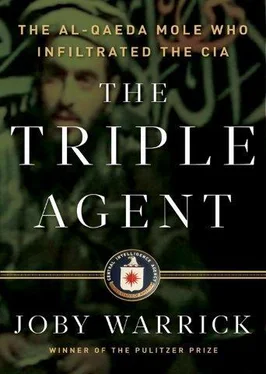Bin Zeid was receiving verbal high-fives from his Jordanian colleagues over the stunning performance of his star recruit, and he wanted to pass the compliments along. Balawi had surprised everyone, bin Zeid most of all. How had he managed it? What else could he provide?
The encouragement seemed to work. In the weeks after Balawi resurfaced, as the dry northerly winds of autumn swept away the last traces of summer’s heat, his e-mails crackled with interesting tidbits. He described jihadist fighters he met, passed along rumors, and sketched out the complex web of relations among local militant groups.
More intriguingly, he began to serve up graphically detailed descriptions of the damage wrought by CIA missile strikes, down to conditions of the corpses and body parts pulled from the shattered cars and flattened houses. He wrote about the frustration and rage among Taliban and al-Qaeda leaders, all of whom now lived in dread of the buzzing machays .
Balawi could rarely be precise about locations—he was still a stranger to the area and spoke little Pashto—but his reports helped the agency’s Predator teams narrow their search for targets. Some agency officials concluded that as many as five Taliban soldiers were killed as a result of Balawi’s detailed accounts. After a missile strike, the informant would e-mail bin Zeid with his on-the-scene accounts of death and mayhem, along with words of encouragement. You’re on the right track now , he would say.
CIA analysts in Amman and Langley studied the messages with increasing fascination. The agency collected its own bomb damage assessments, usually based on video taken by Predators lingering in the area after a strike. Its reports matched Balawi’s with striking accuracy. The Jordanian was clearly present at the targeted sites, presumably giving medical aid, because his reporting was unfailingly spot-on.
Technically Balawi was communicating only with bin Zeid, who had been assigned to the case full-time. But increasingly CIA officials discovered that they could ask questions and get rapid answers. Balawi was displaying the hallmarks of a true double agent, despite his utter lack of training.
The CIA had recruited a handful of successful double agents during the Cold War, most famously the Soviet military intelligence colonel Oleg Penkovsky, code-named Agent Hero. It was Penkovsky who alerted the Kennedy administration in 1962 to secret, Soviet-built missile launch sites in Fidel Castro’s Cuba, a tip that started the Cuban missile crisis. Penkovsky was himself betrayed by a Soviet double agent and executed in 1963.
More recently the CIA had used informants, most of them recruited by the spy networks of friendly governments, to dismantle terrorist groups. Secret agents were instrumental in defeating Abu Musab al-Zarqawi’s terrorist cell in Iraq, as well as the al-Qaeda–allied Indonesian terrorist ring known as Jemaah Islamiyah. In the latter case, the group’s leader, Riduan Isamuddin, better known by his nom de guerre, Hambali, was ratted out by an informant and captured in a joint operation by the CIA and Thai police near Bangkok in 2003. His organization in tatters, Hambali was shuffled among CIA secret prisons before finally landing at the U.S. detention camp at Guantánamo Bay, Cuba.
Could Balawi become the greatest double agent of them all?
The other intelligence officer assigned full-time to the Balawi case wasn’t so sure. CIA case officer Darren LaBonte was wary by nature. He also was extremely protective of bin Zeid, a man he had known for only nine months but regarded as a close friend or perhaps even a younger brother. Though the two men were seasoned intelligence officers of roughly the same age, LaBonte was taller by half a head and battle hardened from multiple tours of Afghanistan. The two traveled together on joint assignments as far as Southeast Asia and Eastern Europe, sharing information and coordinating tactics in a way that mirrored the close ties between their two countries. But as they worked, LaBonte secretly kept watch, worrying about his friend’s vulnerability to kidnapping, assassination, or even mistreatment by the Mukhabarat, with its rivalries and inscrutable internal politics.
“He needs me,” he explained to an associate in Amman. “I have to be there for Ali.”
LaBonte had initially moved to the Middle East from South Asia to cool off. The former Army Ranger had been running covert missions as a CIA paramilitary officer in violent eastern Afghanistan for nearly two years, a job that fitted him as easily as the hard-knuckled military gloves he liked to wear during firefights. But in early 2009, when the CIA offered a new position in relatively tranquil Jordan, LaBonte decided to take it. At thirty-four, he was now a family man. Besides, he had been getting signals lately that it was time to ease off on the adrenaline.
The first sign was the rocket-propelled grenade that came within a whisker of creasing his face. LaBonte had been deep inside Taliban country at the time, near an Afghan border town called Asadabad, when an insurgent pointed a launching tube directly at him. The projectile whooshed past within easy arm’s reach, so close that LaBonte could feel the rush of wind and smell the propellant. He was still shaky when he called his wife over Skype hours later, just to hear her voice.
A second message arrived on the day his daughter, Raina, was born. LaBonte had flown all night from Afghanistan to make it home for the delivery, and he arrived at Washington’s Dulles Airport to discover that his wife, Racheal, was already in labor. He jumped into his father’s waiting car, and the pair cut and swerved through sixty-five miles of traffic to the Annapolis, Maryland, hospital where the doctors were trying their best to slow the clock. The car roared up to the hospital door, and LaBonte leaped out and blew past orderlies and wheelchairs in a sprint to the maternity ward. The nurses draped a gown over the sweaty, unwashed father-to-be and led him into the delivery room just in time to see his first child brought into the world.
Just over a year later LaBonte put the body armor and night-vision goggles away and said good-bye to Afghanistan, perhaps forever. His new posting, the CIA’s largest counterterrorism hub in the Middle East, was hardly sleepy, but the Jordanian capital was stable enough to accommodate officers’ families. For the first time in years, LaBonte could look forward to evenings at home with his wife, and Racheal could be spared the constant worrying that her husband had been wounded in an ambush or blown up by a roadside bomb.
But Amman was no rest stop. By March 2009, three months after the move, the contours of LaBonte’s new role were finally clear. As he had hoped, he now hunted even bigger quarry, international terrorists, rather than the Taliban hirelings he had often chased in the Afghan hills. Soon he was busier than ever, routinely working late into the evening and traveling abroad for secret meetings with a whirligig of turncoats, hustlers, and informants.
He and bin Zeid had become a remarkable team. Bin Zeid brought a deep knowledge of Arab culture and years of experience investigating jihadist networks throughout the Middle East. LaBonte was a combat veteran expert at all the practical skills essential to covert work, from stakeouts to kicking in doors.
LaBonte’s call sign among his Ranger comrades had been Spartan. It was a name that particularly suited LaBonte, a man who was forever being compared to action heroes. Relatives playfully called him Captain America because of his earnest patriotism and the way he unabashedly spoke about wanting to protect his country. His agency friends joked about his “spidey sense,” his uncanny knack for sniffing out danger like Spider-Man.
He even looked the part. Six feet tall and broad-shouldered, LaBonte was two hundred pounds of rugged good looks and muscle, a born athlete who was said to bench-press four hundred pounds and run a marathon after barely bothering to train for it. He radiated a kind of unforced confidence that made him a natural leader, first as a standout baseball player and later as a martial arts champion, an Army Ranger, and an FBI cadet. He liked being in charge because he liked playing the role of older brother or protector.
Читать дальше












